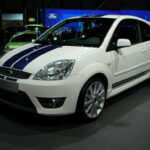Buying a German Car: 5 Pros and 2 Cons
German cars worth $25.3 billion were sold in the U.S alone during the year 2019.
So, is there any truth to the claims that the German car industry is dying? Is it worth buying a German car? What are their pros and cons and what German cars should you look forward to?
Let’s try and find out answers to these common questions.
Is it Worth Buying a German Car?
It is worth buying a German car because German automakers are best known for making luxurious cars of the top segment. They’re high-performing, feature-packed, extremely comfortable, and fuel-efficient cars.
But German cars owner have to endure their fair share of difficulties. On one side if they have high-performance engines, unmatched features, and an overall luxurious experience. On the other hand, they can cost you thousands of dollars in repair and maintenance.
But hey nothing is perfect! If you’re looking for a comfortable ride that is packed with features and laced with mighty powered engines then German cars are probably the best way to go.
Pros of Buying a German Car
High Performance
The German manufacturers have been leading the auto industry in making high-performance cars. Mercedes, BMW, Porsche, and Audi compete with each other to determine who comes out on top.
The engines of BMW X5 M and X6 M can generate 567 hp @ 6000 rpm and the 2015 Mercedes-Benz S65 AMG produces an output as high as 518 hp.
Luxury & Comfortable Experience
If there is one thing German cars are good at providing, it is their luxury experience. They make your life so full of pleasure that you end up missing it in absence of your German car. With the classiest color schemes and hand-crafted leather interiors, every single detail stands witness to the luxury and comfortable experience your car has to offer.
Trending Video: How to Easily Bring Back to Life any Old Car Battery and Save Tons of Money (click to watch)
Feature Packed
The highlight of German cars is their over the moon, unparalleled features. They’re pioneers in introducing features like pedestrian detection, forward collision warning, keyless ignition, remote engine start, panoramic moonroof, android auto, blind-spot system, integrated turn signal mirrors, and much more.
High Quality
Germans paved their way through world war II due to the higher quality of their products. By employing advanced techniques of quality control and assurance Germans have made sure that no sub-standard product leaves the manufacturing facility.
The long-lasting and reliable German cars have set benchmarks for other car companies. Germans have been successful at providing the best quality over the last century.
Read it: 20 Best Cars in Europe (Almost Failure-Free)
Fuel-Efficient
Expensive segment cars are least known for their fuel efficiency. You cannot make a comparison of cars from this segment to cheaper & low-performing Japanese and Korean ones. Yet German automakers have introduced quite efficient cars in the market. The highest efficiency of Audi A3 & BMW 335D has been measured at 13 km per liter.
Cons of Buying a German Car
German cars require high and costly maintenance. Their systems are considerably complex and very difficult to fix.
High Maintenance
German cars require frequent maintenance as compared to their Japanese or Korean counterparts. Their spare parts are very expensive and difficult to find. Due to twisted electronic and complicated systems, most auto mechanics avoid repairing a German car.
Only highly skilled technicians, who specialize in repairing German cars can maintain it. Due to the limited number of German car mechanics in the market, their hourly rates are extremely high.
The average maintenance cost of German cars is between $900 and $1,100. As opposed to maintenance of their counterparts which costs under $550.
Complicated Systems
German cars have extremely intricate systems. Especially electronic systems are one of a kind puzzle. The worst part is that you cannot enjoy most of the features in your car due to faulty electronics. So, your German car jam-packed with features is practically of no good.
Due to this problem of electronics, Volkswagen had to issue a major recall on Jetta SEL in 2015. It had a basic fuse-related error. This goes on to show the severity of the matter.
Read it: Japanese vs European Cars Comparison (Reliability, Price, etc.)
What are the Myths about German Cars that aren’t True?
There are myths about German cars that they are unreliable and disliked outside Europe. Both of which are not true.
Like any other famous entity, German cars have a lot of myths and rumors floating about them in the market. Let’s take a look at the most common myths about German cars that aren’t true.
German cars aren’t reliable
German cars have a lot of issues. But they are completely reliable. The vehicles from German manufacturers have stood the test of time. Most of the German cars last about 200,000 miles. Which is more than good for an average car.
German cars don’t sell outside Europe
People often speculate that European vehicles sell only in Europe. This is only partially true. Since German cars are made to the needs of European customers hence they cannot stand tropical climates. Still, there is a large market for German cars outside Europe.
The U.S and China are the biggest importers of German cars outside Europe. They have a combined export value nearing $50 billion in 2019 alone. So, the myth that German cars don’t sell outside Europe is completely false.
Also read: Are French Cars Reliable? 16 Things You Need to Know
Which German Cars Should You Buy?
Jetta, Golf, and Passat by Volkswagen, Mercedes Benz A-class & CLA, Audi A6 and BMW series 3 are some of the best German cars to buy in 2021.
1. Volkswagen Jetta: Volkswagen Jetta has been rated as the best German car to buy in 2021. It is the best German car you can buy on a budget. The Volkswagen Jetta is a 5-seater vehicle that comes with a 1.4L I4 Turbo engine and Front Wheel Drive. This Jetta is estimated to deliver 29 MPG in the city and 39 MPG on the highway.
Features & Highlights: Wireless charging, start-stop button, front cooled seats, In-car Wi-Fi, moonroof, adaptive cruise control, forward collision control, android auto, highly fuel-efficient, excellent handling, large cabin
Price: $20,790
2. Volkswagen Golf: Volkswagen is a compact 4 door hatchback. The Volkswagen Golf GTI is a 5-seater vehicle that comes with a 2.0L I4 Turbo engine and Front Wheel Drive. This Golf GTI is estimated to deliver 24 MPG in the city and 32 MPG on the highway.
Features & Highlights: Pedestrian detection, start-stop system, parallel automatic parking, curve adaptive headlamps, panoramic moonroof, adaptive cruise control, forward collision warning, android auto, rapid acceleration, smooth handling, stylish interior.
Price: $34,460
3. Volkswagen Passat: It is a perfect family-sized sedan. The Volkswagen Passat is a 5-seater vehicle that comes with a 2.0L I4 Turbo engine and Front Wheel Drive. This Passat is estimated to deliver 24 MPG in the city and 36 MPG on the highway.
Features & Highlights: Pedestrian detection, start-stop system, parallel automatic parking, curve adaptive headlamps, lane keep assist, adaptive cruise control, forward collision warning, android auto, low priced, roomy interior, relaxing ride.
Price: $27,990
4. Audi A6 Allroad: Audi A6 Allroad is a luxury segment SUV. The Audi A6 Allroad is a 5-seater vehicle that comes with a 3.0L V6 Turbo engine and All Wheel Drive. This A6 Allroad is estimated to deliver 20 MPG in the city and 26 MPG on the highway.
Features & Highlights: Hill descent assist, wireless charging, start-stop system, around view camera, front cooled seats, heads up display, panoramic moonroof, a hands-free trunk, power trunk, stylish interior, high-tech, sportier, driver assist.
Also read: Are Audis Reliable After 100k Miles? The Truth
Price: $66,945
5. Mercedes Benz A-Class: Mercedes Benz A-class is a posh segment sedan. The Mercedes-Benz A-Class is a 5-seater vehicle that comes with a 2.0L I4 Turbo engine and All Wheel Drive. This A-Class is estimated to deliver 25 MPG in the city and 34 MPG on the highway.
Features & Highlights: Pedestrian detection, forward collision warning, keyless ignition, remote engine start, panoramic moonroof, android auto, blind-spot system, integrated turn signal mirrors, sporty handling, spacious cabin, highly comfortable.
6. Mercedes Benz-CLA: It is one of the cheapest Mercedes Benz available on market. The Mercedes-Benz CLA is a four-door, 5-seater vehicle that comes with a 2.0L I4 Turbo engine and all-wheel Drive. This CLA is estimated to deliver 24 MPG in the city and 33 MPG on the highway.
Features & Highlights: Pedestrian detection, forward collision warning, keyless ignition, remote engine start, panoramic moonroof, android auto, blind-spot system, integrated turn signal mirrors, classy exterior, smooth power terrain and handling, stylish interior, high performance.
Price: $40,900
7. BMW 3-Series: BMW series 2,3, and 5 are all luxury sector sedans. The BMW 3 Series is a 5-seater vehicle. The most popular style is the 330i x Drive. It comes with a 2.0L I4 Turbo engine and All Wheel Drive. This 3 Series is estimated to deliver 25 MPG in the city and 34 MPG on the highway.
Features & Highlights: Pedestrian detection, forward collision warning, start-stop system, apple car play, rear parking sensors, moonroof, navigation, integrated turn signal mirrors, classy exterior, smooth power terrain and handling, stylish interior, high performance
What are the Best Alternatives for German Cars?
Kia K900, Cadillac Escalade, Lexus LS, Volvo XC90 & S90 are some of the best alternatives if you’re looking forward to replace your high-end, feature-packed, and luxury German car.
German cars sure have some downsides. If you’re not willing to invest huge amounts of money in expensive German automobiles then there is nothing to worry about. You have a whole lot of options to choose from.
1. Kia K900: The 2020 Kia K900 comes with a turbocharged 3.3-liter V-6 engine. This engine generates 365 horsepower and 376 lb-ft of torque. It can very well match the high-performing engines of German cars.
Price: $60,935
Also read: Do Kias Hold Their Value? (7 Models Compared)
Volvo XC90: Volvo XC90 comes with a turbocharged T5 engine paired with a front-wheel drive. This beauty can give you the soothing comfort of an expensive German car.
Price: $50,095
2. Cadillac Escalade: Cadillac’s biggest SUV is powered by either a 6.2-liter V-8 engine that makes 420 horsepower or a turbo-diesel 3.0-liter inline-six. It comes with a 10-speed automatic transmission. Stylish interior and comfortable rides are a few of many things to look for in this car.
Price: $78,000
3. Lexus LS: The standard engine in the LS is a twin-turbocharged 3.4-liter V-6 that delivers a silky-smooth 416 horsepower. It is equipped with a 10-speed automatic transmission. The car is expensive. But who said substituting a German car was going to be cheap.
Price: $77,025
4. Volvo S90: S90 from the Scandinavian manufacturer comes in supercharged and turbocharged variants. These engines can produce a notable 400 horsepower. They’re bound to give tough competition to their German counterparts.
Price: $52,595
Reference:
truecar.com, buyacar.co.uk, hotcars.com, caranddriver.com, autocar.co.uk, reuters.com/, philcarnews.com/, griffinsautorepair.com/, mboffresno.com/, mysfcarguys.com/






